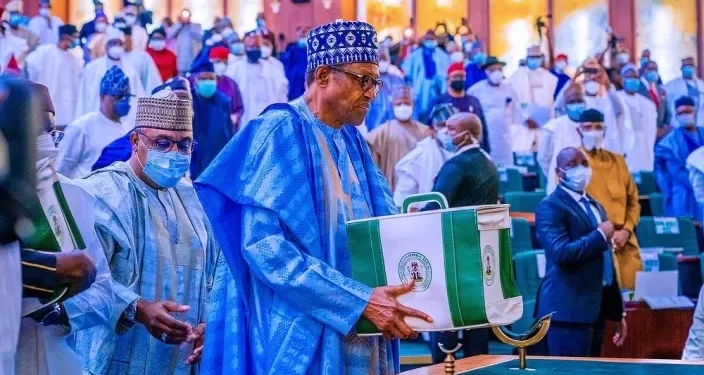Nigeria’s budget deficit to hit 23yr-high on petrol subsidy
Nigeria’s federal government is now projecting to spend N7.35 trillion more than it will earn this year as it makes room for a nine-fold jump in petrol subsidy costs.
That effectively takes the 2022 budget deficit closer to 5 percent of GDP, the highest since 1999, according to data from the Central Bank compiled by BusinessDay.
The implication of the increased budget deficit in 2022 is that the government may end up spending less on capital projects and human capital which are critical in spurring economic growth and delivering jobs.
The latest figure presented to lawmakers Thursday, April 6, by President Muhammadu Buhari, who plans to borrow to make up the difference, marks an increase of N965 billion from the N6.3 trillion initially planned for 2022.
It’s also a 4 percent increase compared to an actual deficit of N7.05 trillion in the eleven months ending 2021, with the full year figure yet to be published.
The biggest contributor to the increased budget deficit is the petrol subsidy bill, provision for which increased nine-fold to N4 trillion from N442.72 billion.
As a percentage of GDP, the projected budget deficit of 5 percent for 2022 eclipses the record set in 2021 of 4.3 percent (as at November) and 4 percent in 2020, which is higher than the 3 percent threshold set by the Fiscal Responsibility Act for the third year running.
“We have raised our fiscal deficit forecast for 2022 from 4.5 percent of GDP to 5 percent of GDP, largest since the 1990s, reflecting high expenses related to petrol subsidies and low crude production limiting revenue despite high world prices,” analysts at the Economist Intelligence Unit said in a report.
“The cost is unsustainable, but an election in early 2023 has sharpened the government’s resolve to continue with price regulation,” the EIU analysts noted.
The last time Nigeria’s fiscal deficit exceeded 4 percent was in 1999 when the government opened the taps on infrastructure spending to give the economy a boost after years of military rule.
That year, the government spent more on capital expenditure (N498bn) than recurrent expenditure (N449bn). The actual deficit amounted to N285 billion, 5.2 percent of GDP.
Read: GRIDCo announce close to 3 months cut in power supply to parts of Accra
In 2022, however, the government will spend 29.84 of its total expenditure on capital projects and 70.16 percent on recurrent expenditure including salaries, debt service and the wasteful petrol subsidy. The petrol subsidy alone adds up to 24 percent of the government’s projected N16.6 trillion total expenditure.
In reality, the government spends less on capital projects than it budgets. In 2020, for instance, it ended up spending about 4 times more on recurrent expenditure (N8.1 trillion) than on capital expenditure (N1.6 trillion) amid lower than planned revenues.
Nigeria’s rising fiscal deficit is another stark reminder of how the petrol subsidy bills continue to eat into the earnings of the cash-strapped government.
Petrol subsidy payment gulped about N1.67 trillion in 2021, according to data from the Nigerian National Petroleum Company. This year it will rise more than two-fold, much faster than the government’s revenues can cover.
The government had initially said the 2022 budget would only provide for subsidy till June but is now set to maintain it till next year when the current administration would have left office.
Oil prices shot above $100 per barrel for the first time in years as Russia invaded Ukraine but this has not benefitted Africa’s biggest oil producer as the country has also been battling with weak oil production. Rampant oil theft has also worsened the country’s precarious situation.
Nigeria’s budget deficit is widening when it should narrow due to higher oil prices. Some other oil exporting countries are eyeing a surplus. Algeria for instance started to pay unemployed persons some money this year thanks to the excess cash derived from higher oil revenues.
Nigeria is also bucking the trend of some other African countries that are seeking to narrow their budget deficits this year.
Ghana announced plans last month to cut spending in order to reduce its budget deficit. The government said it would reduce discretionary spending and lower salaries for top public servants in a bid to reduce its budget deficit to 7.4 percent of GDP from an estimated 12.1 percent last year.
The West African nation’s belt-tightening measures bolstered investor confidence and helped government bonds to their longest rally in two months.








